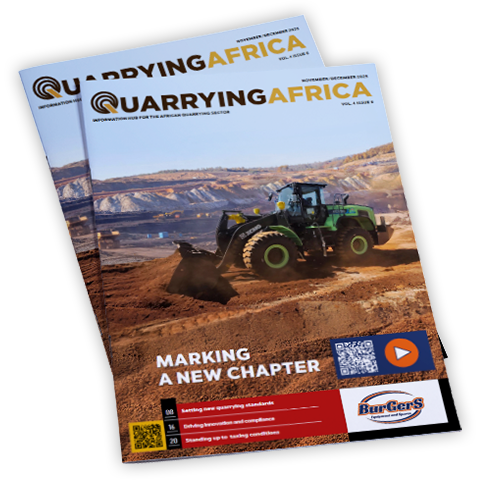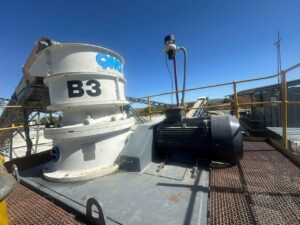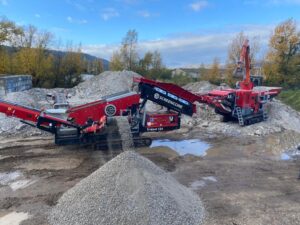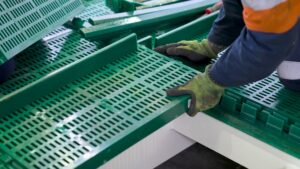For any quarry owner, uptime is a key parameter that influences both productivity and, ultimately, also the bottom line. As the current challenging economic conditions continue to pressurise an already constrained construction materials market, quarry owners are well aware that maximising uptime is largely the basis on which they can survive these ongoing turbulent times.
“Loading operations are a key function of the quarrying and mining value chain at large. It is therefore important to know what’s happening at these operations in real time. The importance of weighing products to eliminate guesswork cannot be stressed enough,” says Webster.

Data is king
Having access to data, in real time, is a key to ensuring efficient and productive loadout operations. According to Webster, it starts with deriving insights that can be turned into actionable change. “The availability of data arms quarry managers with the kind of insights that enable them to improve productivity and impact the bottom line,” he says.
Loadrite onboard weighing systems can be configured to provide the data needed for any operation. Loadtech’s expert installers work with site managers to identify the configuration that will give them the information they need.
“We work with fleet managers individually to ensure the system meets the needs of their business. Our aim is to ensure that data collected provides real value to increase productivity and profitability over the lifecycle of the machine,” says Webster.
The first step, continues Webster, is to understand how productive machines are, including how much fuel they use and how much material they move. The next step is using that information to make changes where necessary to improve uptime, efficiency and reduce costs.
By tracking the amount of material moved per hour to measure productivity and set benchmarks, operators can see underperformance and make appropriate adjustments to ensure all equipment is working at its optimum efficiency.
A Loadrite onboard weighing system such as the L3180 can be used to calculate the weight of material in an excavator’s or loader’s bucket, relay this information to the operator and record the weight for later use. Being able to track the amount of material moved per hour can then be used internally as part of an overall business analysis to measure productivity and set benchmarks.
“Once you know your benchmark productivity rates, it’s also easy to identify equipment that is underperforming, which sets off a trigger for an investigation into the underlying causes. These causes can vary widely, from operator error to equipment failure.”
Once productivity benchmarks are set, fleet managers can customise the Loadrite system to capture a wide range of other data such as cycle times, which can then be used to identify process bottlenecks and inefficiencies. By resolving these issues, managers can improve productivity and reduce operating costs.
The Loadrite system can also measure the cycle times between each loading event, which can show how efficiently the material is being moved. Shorter cycle times generally point to a more efficient and therefore more profitable operation.
To ensure customers get the best out of their data, Loadtech employs a data specialist who is available 24/7 to support customers. “The data specialist is complemented by four technicians and two truck drivers – the team is big enough to run and support our installed base,” says Webster.

Service time
Reducing service time maximises machine uptime. With that in mind, the new Loadrite systems’ design does away with moving parts. The old systems feature rotary triggers and pins, which are susceptible to wear.
In contrast, the new system, particularly the L1380 Smart Scale, features an angle sensor instead of the traditional rotary triggers. This allows the system to offer accurate weighing in tough conditions, while reducing the need for maintenance due to the absence of moving parts.
“Customers are guaranteed more uptime with the L3180 SmartScale. The new multi-axis IMU sensors are more robust with no moving parts, reducing the need for repair and maintenance. They are also faster and less invasive to install, with no need to customise mounting brackets or to weld,” explains Webster.
The Loadrite L3180 SmartScale uses weighing intelligence and solid-state sensors for more accurate, precise and faster loading. It also connects machines and devices for the collection and syncing of data via the built-in WiFi to the InsightHQ reporting portal. When using Trimble’s cloud-based InsightHQ quarry reporting portal, personnel can gain access to site production and operator performance KPIs on desktop or mobile devices.
In addition, Loadtech offers rebuild services for all its load weighing systems, allowing customers to upgrade their old systems with new software if need be. The company also offers trade-ins for older systems.

Support
Product support also plays a key role in maximising uptime, points out Webster. To ensure peace of mind for its customers, Loadtech offers Service Level Agreements (SLAs), which define specific metrics for ascertaining service quality.
According to Webster, SLAs are concrete, measurable standards that Loadtech promises to uphold. Examples include customer support response time and service uptime, amongst others.
As part of the SALs, a technician visits a customer once a month, where they conduct inspections to ensure that the load weighing systems are functional. On the day, Loadtech provides certified test weights for calibration purposes. In addition, Loadtech also provides additional operator training to any new operators on site.
“We also use these monthly visits to look at the data fields to ensure they input correctly. We then generate a report on the findings and also provide the customer with a new calibration certificate, which shows that the instrument is measuring correctly,” explains Webster.
Loadtech reports increased uptake of its SLA offering, largely driven by the industry’s push for more uptime. The increased uptake coincides with the general growth of the company’s business. Loadtech is a preferred supplier for big mining clients such as Glencore, B&E International, Danoher and M Civils, as well as big transporters such as Reinhardt Transport.
The company also partners several equipment suppliers such as Burgers Equipment & Spares (LiuGong dealer), Dura Equipment (Lovol dealer) and Babcock (Volvo CE dealer).
“We have seen incredible business growth of 20-25% in the past two years,” says Webster. “During the same period, our SLAs have grown to a point where we had to invest in a new truck to move the certified test weights between sites.”






